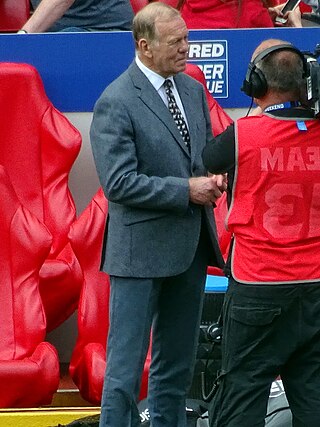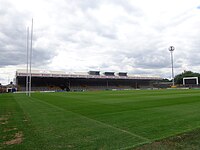
The Australian national rugby league team, the Kangaroos, have represented Australia in senior men's rugby league football competitions since the establishment of the game in Australia in 1908. Administered by the Australian Rugby League Commission, the Kangaroos are ranked first in the IRL Men's World Rankings. The team is the most successful in Rugby League World Cup history, having won the competition 12 times, and contested 15 of the 16 finals, only failing to reach the final in the 1954 inaugural tournament. Only five nations have beaten Australia in test matches, and Australia has an overall win percentage of 69%.
Gregory Stuart Pierce was an Australian rugby league player, coach and administrator. He played as a lock for the Cronulla-Sutherland Sharks in the National Rugby League competition and for Australia. He captained his country on one occasion.
Robert Fulton, also nicknamed "Bozo", was an Australian international rugby league footballer, coach and later commentator. Fulton played, coached, selected for and has commentated on the game with great success at the highest levels and has been named amongst Australia's greatest rugby league players of the 20th century. As a player Fulton won three premierships with the Manly-Warringah Sea Eagles in the 1970s, the last as captain. He represented the Australian national side on thirty-five occasions, seven times as captain. He had a long coaching career at the first grade level, taking Manly to premiership victory in 1987 and 1996. He coached the Australian national team in thirty-nine Tests. He was a New South Wales State selector and a national selector. He was a radio commentator with 2GB at the time of his death in 2021, aged 73. In 1981, he was selected as one of the initial four post-war "Immortals" of the Australian game and, in 2008, he was named in Australia's team of the century.
Graham "Wombat" Eadie, is an Australian former rugby league footballer who played in the 1970s and 1980s. He has been named amongst Australia's finest of the 20th century. A New South Wales State of Origin and Australian international representative fullback, he played in Australia during Manly-Warringah's dominance of the NSWRFL competition during the 1970s. He won four premierships with them and his 1,917 points in first grade and 2,070 points in all grades were both records at the time of his retirement. Eadie also played in England for Halifax, winning the Challenge Cup Final of 1987 with them. He also won World Cups with Australia and collected awards such as the Rothmans Medal and Lance Todd Trophy.
Kenneth John Irvine, also nicknamed "Mongo", was an Australian professional rugby league footballer who played in the 1950s, 1960s and 1970s. He holds the standing Australian record for the most tries in a first-grade career – 212. No other player has yet managed 200 tries in their Australian club career, with the closest to Irvine's tally being South Sydney Rabbitohs player Alex Johnston who has scored 195 tries. He is also the 2nd all-time top try-scorer for the Australian national team with 33, two behind Darren Lockyer's 35. Irvine's great speed is legendary and he is regarded as Australia's greatest ever winger, being named in 2008 in the list of Australian rugby league's 100 greatest players, as well as being an automatic selection for the Australian Rugby League's "Team of the Century".
Dennis Ward was an Australian professional rugby league footballer. He was a halfback who played first grade in the NSWRFL Premiership for Canterbury-Bankstown and Manly-Warringah from 1965 to 1972, winning the 1972 Grand Final with Manly. He also played for City Firsts, New South Wales and Australia in representative football.

Robert James McCarthy MBE is an Australian former professional rugby league footballer and coach. He played for the South Sydney Rabbitohs, Canterbury-Bankstown Bulldogs, New South Wales and for the Australian national side. He later coached in Brisbane, taking Souths Magpies to a premiership in 1981 and coaching the Gold Coast-Tweed Giants upon their entry to the Winfield Cup. Since 2001 he has been the chairman of both the Australian and NSW state selection panels.

Malcolm John Reilly OBE is an English former rugby league player and coach. He played in the 1960s, 1970s and 1980s, and coached in the 1970s, 1980s, 1990s and 2000s. He played at representative level for Great Britain, England and Yorkshire, and at club level for Castleford in England, and Manly-Warringah Sea Eagles in Australia, as a loose forward,
Steve Walters, also known by the nickname of "Boxhead", is an Australian former professional rugby league footballer who played in the 1980s and 1990s who at the peak of his career was considered the best hooker in the game. An Australian Kangaroos and Queensland Maroons representative, he played in the Canberra Raiders' 1st, 2nd and 3rd NSWRL grand final victories.
Frank Stanton, also known by the nickname of "Biscuits", is an Australian former professional rugby league footballer who played in the 1960s, and was a successful club and national representative coach in the 1970s and 1980s. He was educated at North Sydney Boys High School. Both his playing and his club coaching careers were with the Manly Warringah Sea Eagles, although he later also went on to coach the Balmain Tigers and North Sydney Bears. He enjoyed success as coach of the Australian national side from 1978 to 1984, being at the helm in the period when the Kangaroos began to consistently dominate the other rugby league playing nations. Since the death of Norm Provan on 13 October 2021, Stanton is both the oldest and earliest winning of all the living premiership winning coaches.
The 1978 Kangaroo tour of Great Britain and France comprised the Australia national rugby league team's fourteenth tour of Great Britain and ninth tour of France and took place from September to December 1978. Coached by Frank Stanton and captained by Bob Fulton, the Australian team, also known as the Kangaroos, played a match against Wales before contesting the Ashes series against Great Britain, winning the third and deciding Test match. The tourists then moved on to France where they were narrowly beaten in both Tests, the last series the Kangaroos would lose until 2005. In addition to these six internationals, the Australians played sixteen other matches against local club and representative sides in both countries. The 1978 Kangaroo tour followed the tour of 1973 while the next tour would be staged in 1982.
The 1963-64 Kangaroo tour was the eleventh Kangaroo tour, during which the Australian national rugby league team traveled to Europe and played thirty-six matches against British and French club and representative teams. It included three Test matches against Great Britain for The Ashes, and three Tests against the French. The tour followed the 1959-60 Kangaroo tour of Great Britain and France and was followed by the 1967-68 Kangaroo tour of Great Britain and France.
The 1985 Kangaroo Tour of New Zealand was a mid-season tour of New Zealand by the Australia national rugby league team. The Australians played six matches on tour, including the final two games of a three-game test series against the Graham Lowe coached, Mark Graham captained New Zealand Kiwis, with the first test taking place at Lang Park in Brisbane on 18 June. The New Zealand tour began on 19 June and finished on 10 July.
The 1980 Kangaroo Tour of New Zealand was a mid-season tour of New Zealand by the Australia national rugby league team. The Australians played seven matches on tour, including a two test series against the New Zealand national rugby league team. The tour began on 1 June and finished on 17 June.
The 1971 Kangaroo Tour of New Zealand was a mid-season tour of New Zealand by the Australia national rugby league team. The Australians played three matches on tour, including a test against the New Zealand national rugby league team. The tour began on 22 June and finished on 29 June.
The 1954 Great Britain Lions tour was a tour by the Great Britain national rugby league team of Australia and New Zealand which took place between May and August 1954. Captained by Dickie Williams, the tour involved a schedule of 32 games: 22 in Australia and 10 in New Zealand, with two three-match Test Series against both nations.
The tour began inauspiciously, with Great Britain losing four of their first seven matches, including the First Test against Australia in Sydney. Moving into the Queensland leg, the Lions' results improved, and they won all nine of their matches in the state. This included victory in the Second Test in Brisbane.
A common feature of many of the tour matches was rough play, punches being throw in and out of tackles. The July 10 match against New South Wales was abandoned by the referee seventeen minutes into the second half due to persistent brawling by the players.
One week after the abandoned game, Australia won the Third Test to claim the Ashes by a 2–1 margin.
Moving to New Zealand, Great Britain lost the Second Test, but recovered to win the Third Test and the series, by a 2–1 margin.
The tour concluded with three matches in five days back in Australia at Sydney, Canberra and Maitland.
Despite being a British team – five of the squad were Welsh, two from Scotland and hooker Tom McKinney from Northern Ireland – the team played, and were often referred to by both the press at home and away, as England.
The 1956–57 Kangaroo tour was the ninth Kangaroo tour, in which the Australian national rugby league team travelled to Great Britain and France and played twenty-eight matches, including the Ashes series of three Test matches against Great Britain and three Test matches against the French. It followed the tour of 1952-53 and the next was staged in 1959-60.
The 1952–53 Kangaroo tour was the eighth Kangaroo tour, in which the Australian national rugby league team travelled to Great Britain and France and played forty matches, including the Ashes series of three Test matches against Great Britain and three Test matches against the French. It followed the tour of 1948-49 and the next was staged in 1956-57.
The 1948–49 Kangaroo tour was the seventh Kangaroo tour, in which the Australian national rugby league team travelled to Great Britain and France and played thirty-seven matches, including the Ashes series of three Test matches against Great Britain, an international match against Wales and two Test matches against the French. It followed the tour of 1937-38 and a cessation of overseas international tours due to World War II. The next was staged in 1952-53.
The 1937–38 Kangaroo tour was the sixth Kangaroo tour, in which the Australian national rugby league team travelled to New Zealand, Great Britain and France and played thirty-eight matches, including the Ashes series of three Test matches against Great Britain, and two Test matches each against the Kiwis and French. It followed the tour of 1933-34. Following a cessation of overseas international tours due to World War II, the next tour was staged in 1948-49.





